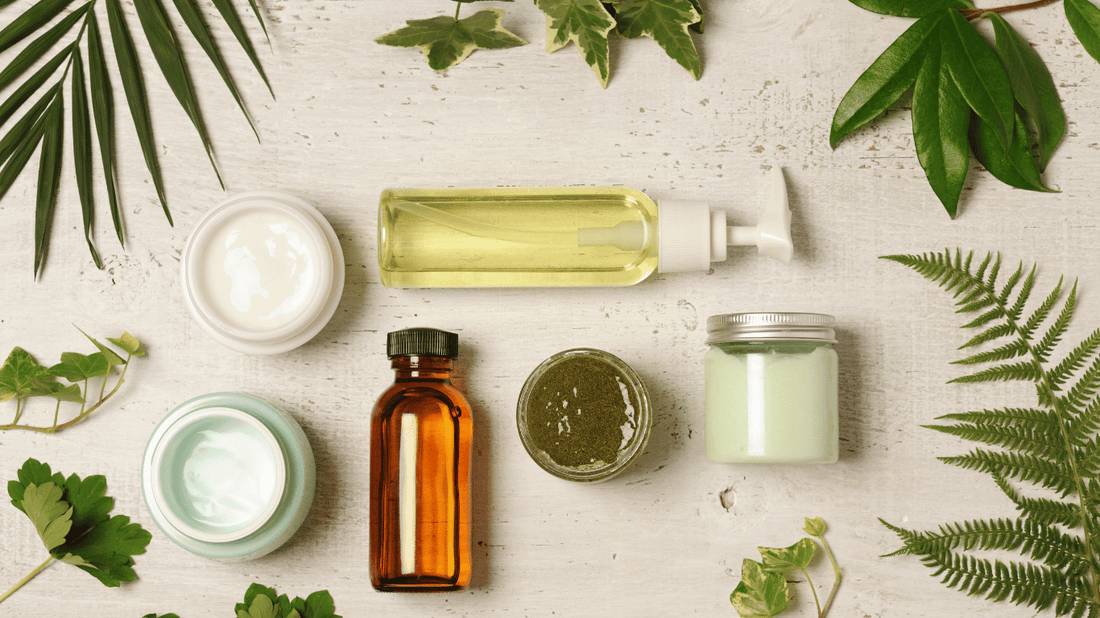Skincare products are a staple in our daily routines, promising glowing, youthful skin. However, many of these products contain synthetic ingredients that pose significant health risks. Understanding the dangers of synthetic ingredients in skincare is crucial for making informed choices that protect both our health and the environment. This article explores the common synthetic ingredients found in skincare products, their associated health risks, environmental impacts, and safer alternatives, emphasising the importance of a daily natural skincare routine.
Common Synthetic Ingredients in Skincare

Parabens: Uses and Health Concerns
Parabens, widely used as preservatives in cosmetics, prevent the growth of harmful bacteria and mould. However, studies have shown that parabens can mimic estrogen, disrupting hormonal balance and increasing the risk of breast cancer and reproductive toxicity. Found in lotions, shampoos, and makeup, the presence of parabens in skincare products is a significant concern for consumers.
Phthalates: Role in Skincare and Potential Risks
Phthalates, used to enhance the flexibility and longevity of fragrances, are common in perfumes, shampoos, and nail polishes. These chemicals are known endocrine disruptors, interfering with hormone production and leading to reproductive health issues, including reduced fertility and developmental problems in children.
Triclosan: Antibacterial Properties and Associated Dangers
Triclosan, an antibacterial agent found in soaps, toothpaste, and deodorants, has been linked to endocrine disruption and the development of antibiotic-resistant bacteria. Long-term exposure to triclosan can lead to thyroid dysfunction and other hormonal imbalances, raising significant health concerns.
Formaldehyde-releasing Preservatives: Hidden Carcinogens in Everyday Products
Formaldehyde-releasing preservatives, such as diazolidinyl urea and quaternium-15, are used in skincare products to prevent microbial growth. Formaldehyde is a known human carcinogen, and prolonged exposure can cause skin irritation, allergies, and respiratory problems. These hidden dangers in skincare products highlight the need for greater transparency and regulation.
Synthetic Fragrances: Undisclosed Chemicals and Health Impacts
Synthetic fragrances, often labelled simply as "fragrance" or "parfum," can contain a cocktail of undisclosed chemicals. These ingredients can cause allergic reactions, skin irritation, and respiratory issues. The lack of disclosure makes it challenging for consumers to identify and avoid harmful chemicals in their skincare products.
Health Risks of Synthetic Ingredients

Endocrine Disruption
Many synthetic ingredients in skincare products, such as phthalates, parabens, and triclosan, act as endocrine disruptors. These chemicals can mimic or block hormones, leading to reproductive problems, thyroid dysfunction, and developmental issues. The potential for synthetic ingredients to disrupt the endocrine system is a significant health concern.
Carcinogenic Potential
Certain synthetic ingredients, including formaldehyde-releasing preservatives and some UV filters, have been linked to cancer. For example, formaldehyde is a known carcinogen, and long-term exposure can increase the risk of cancers such as leukaemia. The potential carcinogenic effects of synthetic ingredients underscore the importance of using safer alternatives.
Skin Irritation and Allergies
Synthetic chemicals like SLS (Sodium Lauryl Sulfate) and parabens can cause skin irritation, contact dermatitis, and allergic reactions. Individuals with sensitive skin are particularly vulnerable to these adverse effects, highlighting the need for gentle, natural skincare products.
Environmental Impact of Synthetic Ingredients

Pollution from Production Processes
The production of synthetic ingredients often involves harmful chemicals that can pollute air, water, and soil. This environmental contamination can have far-reaching effects on ecosystems and human health, making it essential to consider the environmental impact of our skincare choices.
Bioaccumulation in Wildlife and Ecosystems
Synthetic ingredients can accumulate in the environment, affecting wildlife and ecosystems. Chemicals such as phthalates and PFAS (Per- and polyfluoroalkyl substances) can persist in the environment, posing long-term risks to both animals and humans. The bioaccumulation of these chemicals highlights the need for sustainable, eco-friendly skincare products.
Regulatory Landscape and Consumer Protection
Current Regulations on Cosmetic Ingredients
The cosmetics industry is largely self-regulated, with limited oversight from regulatory bodies. This lack of stringent regulations allows many harmful synthetic ingredients to remain in skincare products. However, there is growing consumer demand for stricter regulations and greater transparency in the cosmetics industry.
Efforts Towards Stricter Regulations and Consumer Advocacy
Consumer advocacy groups and some forward-thinking companies are pushing for stricter regulations on synthetic ingredients in skincare products. The Environmental Working Group (EWG) and other organisations advocate for safer, more transparent products to protect consumers from harmful chemicals.
Safer Alternatives to Synthetic Ingredients

Natural Preservatives and Their Effectiveness
Natural preservatives, such as vitamin E and grapefruit seed extract, offer a safer alternative to synthetic preservatives. These ingredients help prevent microbial growth without the health risks associated with synthetic chemicals. Using natural preservatives can significantly reduce the dangers of synthetic ingredients in skincare.
Plant-based Ingredients with Skincare Benefits
Plant-based ingredients, like aloe vera, chamomile, and lavender, provide numerous skincare benefits without the harmful effects of synthetic chemicals. These natural ingredients are gentle on the skin and effective in treating various skin conditions, making them ideal for a daily natural skincare routine.
The Rise of Clean Beauty Products
The clean beauty movement focuses on using natural, non-toxic ingredients in skincare products. Brands that adhere to clean beauty principles avoid harmful synthetic ingredients and prioritise transparency, helping consumers make safer choices for their skin and overall health.
How to Identify and Avoid Harmful Ingredients
Reading and Understanding Labels
To avoid the dangers of synthetic ingredients in skincare, it's essential to read and understand product labels. Look for certifications from trusted organisations, such as EWG Verified, and avoid products with vague ingredient lists that include terms like "fragrance" or "parfum."
Trusted Certifications and What They Mean
Certifications from organisations like the Environmental Working Group (EWG) or COSMOS Organic ensure that products meet high standards for safety and sustainability. These certifications help consumers identify safer skincare options and avoid harmful synthetic ingredients.
Resources for Researching Ingredient Safety
Websites like EWG's Skin Deep Database and the Campaign for Safe Cosmetics provide valuable information on the safety of skincare ingredients. Using these resources can help consumers make informed choices and avoid products containing harmful synthetic chemicals.
Conclusion
The dangers of synthetic ingredients in skincare are significant, impacting both health and the environment. By becoming informed consumers and choosing natural, non-toxic products, we can protect ourselves and promote a healthier planet. Brands like natrl skincare are leading the way by offering products free from harmful synthetic ingredients, prioritising transparency, and advocating for stricter regulations in the cosmetics industry. Embrace a daily natural skincare routine to safeguard your health and the environment.
At natrl skincare, we believe in the power of natural ingredients to provide effective and safe skincare solutions. Our products are free from synthetic chemicals, ensuring you can enjoy the benefits of skincare without the risks. Visit natrl skincare to discover our range of natural skincare products and make the switch to a healthier, more sustainable beauty routine.

 Whatsapp us!
Whatsapp us!